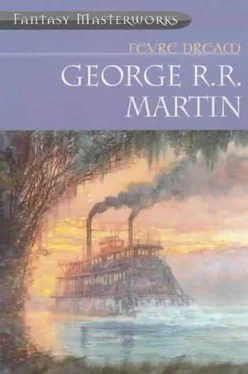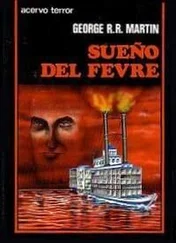George Martin - Fevre Dream
Здесь есть возможность читать онлайн «George Martin - Fevre Dream» весь текст электронной книги совершенно бесплатно (целиком полную версию без сокращений). В некоторых случаях можно слушать аудио, скачать через торрент в формате fb2 и присутствует краткое содержание. Жанр: Фэнтези, на английском языке. Описание произведения, (предисловие) а так же отзывы посетителей доступны на портале библиотеки ЛибКат.
- Название:Fevre Dream
- Автор:
- Жанр:
- Год:неизвестен
- ISBN:нет данных
- Рейтинг книги:4 / 5. Голосов: 1
-
Избранное:Добавить в избранное
- Отзывы:
-
Ваша оценка:
- 80
- 1
- 2
- 3
- 4
- 5
Fevre Dream: краткое содержание, описание и аннотация
Предлагаем к чтению аннотацию, описание, краткое содержание или предисловие (зависит от того, что написал сам автор книги «Fevre Dream»). Если вы не нашли необходимую информацию о книге — напишите в комментариях, мы постараемся отыскать её.
Fevre Dream — читать онлайн бесплатно полную книгу (весь текст) целиком
Ниже представлен текст книги, разбитый по страницам. Система сохранения места последней прочитанной страницы, позволяет с удобством читать онлайн бесплатно книгу «Fevre Dream», без необходимости каждый раз заново искать на чём Вы остановились. Поставьте закладку, и сможете в любой момент перейти на страницу, на которой закончили чтение.
Интервал:
Закладка:
“You give me that money, Mister York, and you’ve got yourself a partner. There’s your answer, sir. You want half of Fevre River Packets, and a partner who runs things quiet and don’t ask you no questions ’bout your business? Fine. Then you give me the money to build a steamboat like that.”
Joshua York stared at the big side-wheeler, serene and silent in the darkness, floating easily on the water, ready for all challengers. He turned to Abner Marsh with a smile on his lips and a dim flame in his dark eyes. “Done,” was all he said. And he extended his hand.
Marsh broke into a crooked, snaggle-toothed grin, wrapped York’s slim white hand within his own meaty paw, and squeezed. “Done, then,” he said loudly, and he brought all his massive strength to bear, squeezing and crushing, as he always did in business, to test the will and the courage of the men he dealt with. He squeezed until he saw the pain in their eyes.
But York’s eyes stayed clear, and his own hand clenched hard around Marsh’s with a strength that was surprising. Tighter and tighter it squeezed, and the muscles beneath that pale flesh coiled and corded like springs of iron, and Marsh swallowed hard and tried not to cry out.
York released his hand. “Come,” he said, clapping Marsh solidly across the shoulders and staggering him a bit. “We have plans to make.”
CHAPTER TWO
New Orleans, May 1857
Sour Billy Tipton arrived at the French Exchange just after ten, and watched them auction four casks of wine, seven crates of dry goods, and a shipment of furniture before they brought in the slaves. He stood silently, elbows up against the long marble bar that extended halfway around the rotunda, sipping an absinthe while he observed the encanteurs hawk their wares in two languages. Sour Billy was a dark, cadaverous man, his long horseface scarred by the pox he’d had as a boy, his hair thin and brown and flaky. He seldom smiled, and he had frightening ice-colored eyes.
Those eyes, those cold and dangerous eyes, were Sour Billy’s protection. The French Exchange was a grand place, altogether too grand for his tastes, and for a fact he did not like to come there. It was in the rotunda of the St. Louis Hotel, beneath a towering dome from which daylight cascaded down onto auction block and bidders. The dome was eighty feet across, easily. Tall pillars circled the room, galleries ran round the inside of the dome, the ceiling was elaborate and ornamental, the walls were covered with odd paintings, the bar was solid marble, the floor was marble, the desks of the encanteurs were marble. The patrons were as fine as the decor; rich planters from upriver, and young Creole dandies from the old city. Sour Billy loathed the Creoles, them with their rich clothes and haughty ways and dark, contemptuous eyes. He did not like to go among them. They were hot-blooded and quarrelsome, much given to dueling, and sometimes one of the young ones would take offense at Sour Billy, at the way he mangled their language and looked at their women, at the disreputable, scruffy, presumptuous American ness of him. But then they would catch sight of his eyes, pale and staring and edged with malice-and, often as not, they would turn away.
Still, left to his own devices, he’d do his nigger-buying over at the American Exchange in the St. Charles, where manners were less refined, English was spoken in place of French, and he felt less out of place. The grandeur of the rotunda in the St. Louis did not impress him, except for the quality of the drinks they served.
He came there once a month, nonetheless, and had no choice about it. The American Exchange was a good place to buy a field hand or a cook, dark-skinned as you please, but for a fancy girl, one of the young dusky octaroon beauties that Julian preferred, you had to come to the French Exchange. Julian wanted beauty, insisted on beauty.
Sour Billy did as Damon Julian told him.
It was about eleven when the last of the wine was cleared away, and the traders began to bring in their merchandise from the slave pens on Moreau and Esplanade and Common Streets; men and women, old and young, and children too, a disproportionate number of them light of skin and fair of face. Intelligent as well, Sour Billy knew, probably French-speaking. They were lined up along one side of the room for inspection, and several of the young Creole men walked along the row jauntily, making light comments to one another and viewing today’s stock at close hand. Sour Billy stayed by the bar and ordered another absinthe. He had visited most of the yards yesterday, looked over what there was to offer. He knew what he wanted.
One of the auctioneers brought down a mallet on his marble desk, and at once the patrons ceased their conversation and turned to give him their attention. He gestured, and a young woman of about twenty climbed unsteadily to the top of a nearby crate. She was a slight quadroon with wide eyes, pretty in her way. She wore a calico dress and had green ribbons in her hair, and the auctioneer began singing her praises effusively. Sour Billy watched with disinterest while two young Creoles bid her up. She was finally sold for some $1400.
Next an older woman, said to be a fine cook, was auctioned off, and then a young mother with two children, all sold together. Sour Billy waited through several other sales. It was a quarter past noon and the French Exchange was jammed with bidders and spectators when the item he had chosen came up.
Her name was Emily, the encanteur told them. “Look at her, sirs,” he babbled in French, “just look at her. Such perfection! It has been years since such a lot has been sold here, years, and it will be years before we see another like her.” Sour Billy was inclined to agree. Emily was sixteen or seventeen, he judged, but already very much a woman. She looked a little frightened up on the auction block, but the dark simplicity of her dress set off her figure to good advantage, and she had a beautiful face-big soft eyes and fine cafe-au-lait skin. Julian will like this one.
The bidding was spirited. The planters had no use for such a fancy girl, but six or seven of the Creoles were hot after her. No doubt the other slaves had given Emily some idea what might be in store for her. She was pretty enough to get her freedom, in time, and to be kept by one of those fine Creole dandies in a little house on Ramparts Street, at least until he married. She’d go to the Quadroon Balls in the Orleans Ballroom, wear silk gowns and ribbons, be the cause of more than one duel. Her daughters would have skin even lighter, and grow into the same fine life. Maybe when she got old she’d learn to dress hair or run a boarding house. Sour Billy sipped at his drink, cold-faced.
The bids rose. By $2,000 all but three of the bidders had fallen out. At that point one of them, a swarthy bald-headed man, demanded that she be stripped. The encanteur snapped a curt command, and Emily gingerly undid her dress and stepped out of it. Someone shouted up a lewd compliment that drew a round of laughter from the audience. The girl smiled weakly while the auctioneer grinned and added a comment of his own. Then the bidding resumed.
At $2,500 the bald-headed man dropped out, having gotten his look. That left two bidders, both Creoles. They topped one another three times in succession, forcing the price up to $3,200. Then came the hesitation. The auctioneer coaxed a final bid from the younger of the two men: $3,300.
“Thirty-four hundred,” his opponent said quietly. Sour Billy recognized him. He was a lean young Creole named Montreuil, a notorious gambler and duelist.
The other man shook his head; the auction was over. Montreuil was smirking at Emily with anticipation. Sour Billy waited three heartbeats, until the mallet was about to fall. Then he set aside his absinthe glass and said, “Thirty-seven hundred,” in a loud clear voice.
Читать дальшеИнтервал:
Закладка:
Похожие книги на «Fevre Dream»
Представляем Вашему вниманию похожие книги на «Fevre Dream» списком для выбора. Мы отобрали схожую по названию и смыслу литературу в надежде предоставить читателям больше вариантов отыскать новые, интересные, ещё непрочитанные произведения.
Обсуждение, отзывы о книге «Fevre Dream» и просто собственные мнения читателей. Оставьте ваши комментарии, напишите, что Вы думаете о произведении, его смысле или главных героях. Укажите что конкретно понравилось, а что нет, и почему Вы так считаете.












